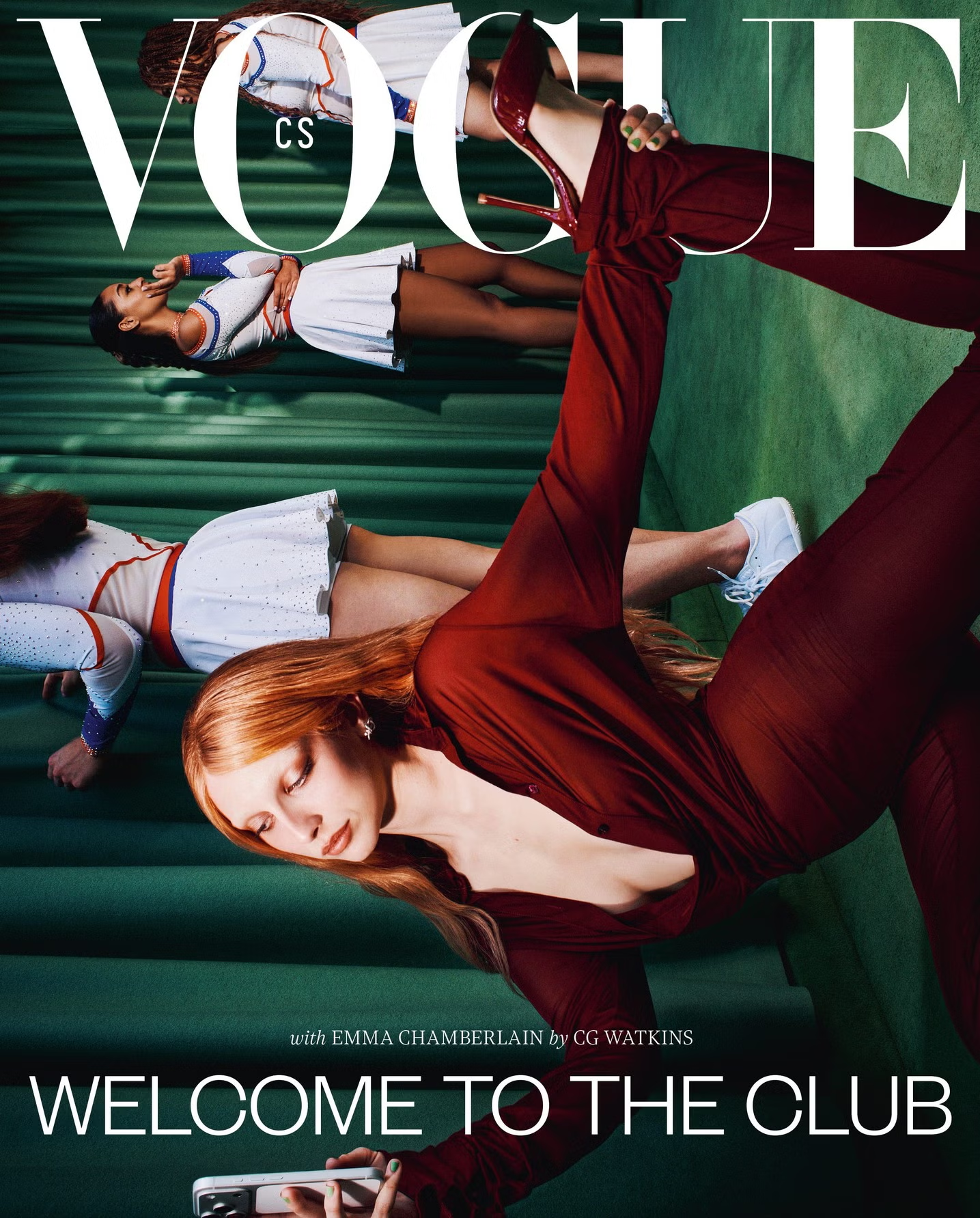Vogue CS in English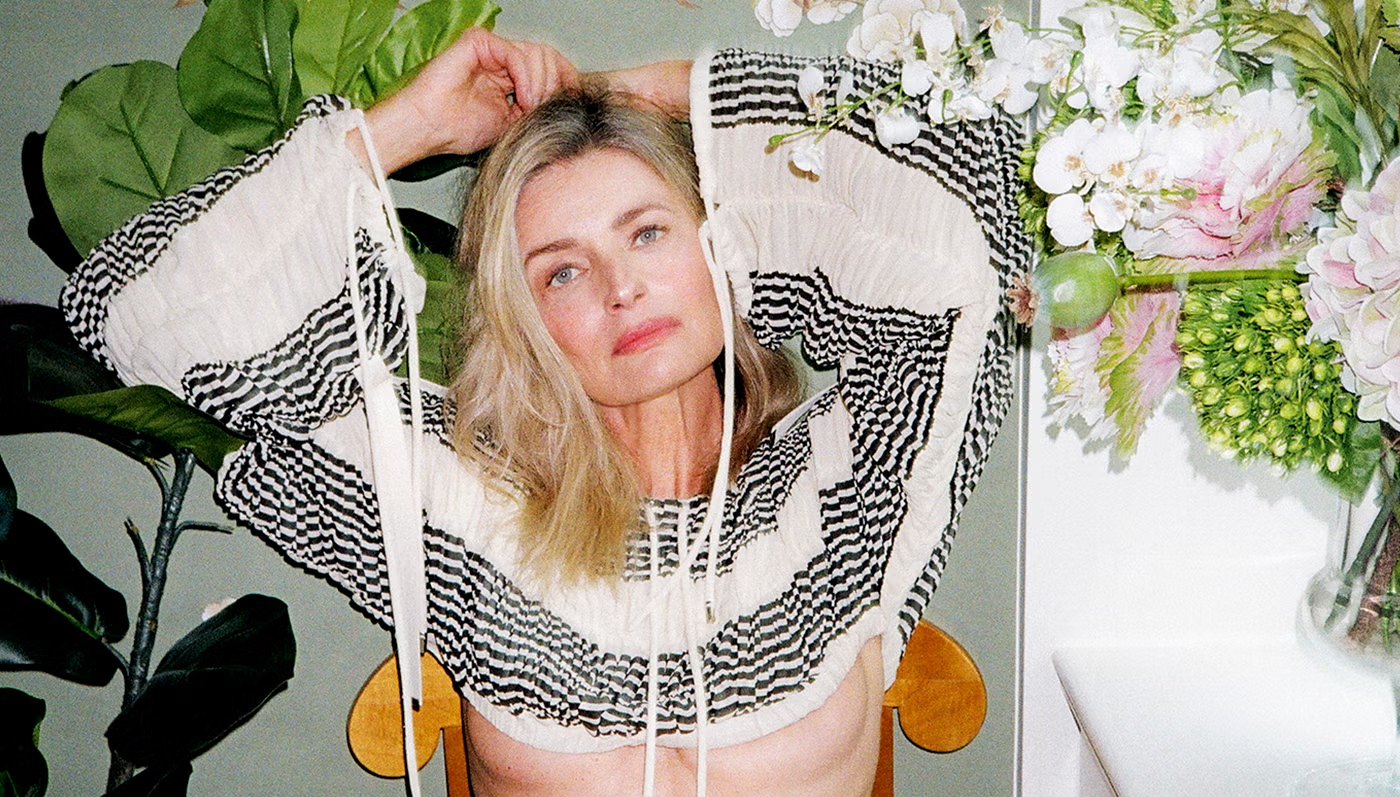
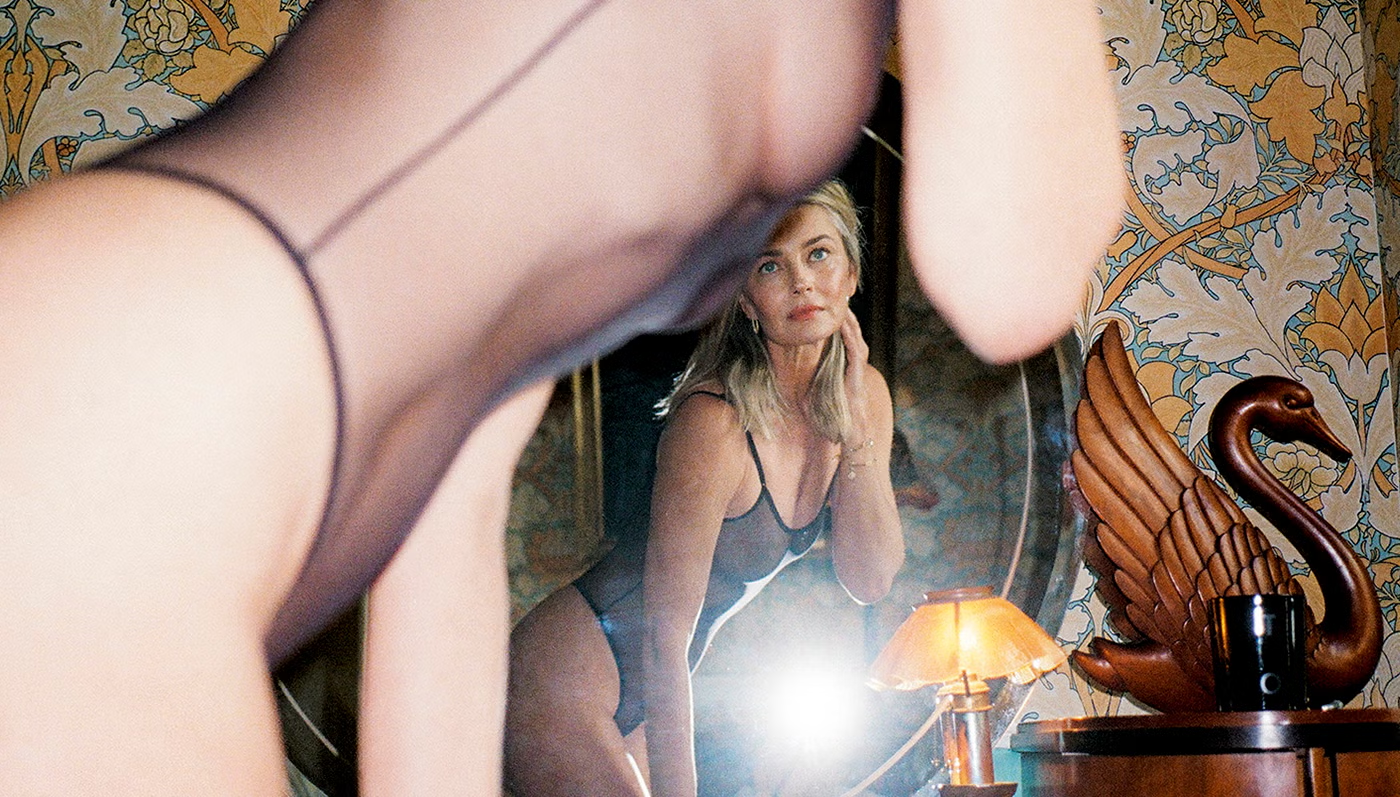
Pavlína Pořízková: When I was the most seen, I was the least heard
Martin Váša19. 4. 2021
If candor were an Olympic sport, she would win the gold. If her life were a Netflix series, many of us would binge watch it on the day of its premier. At least I would: a 100% match. Pavlína Pořízková, the May cover star of Czechoslovak Vogue, speaks in our interview openly about bullying, self-acceptance, maturity, and the search for her calling in life.
Pavlína was three years old when her parents emigrated to Sweden. Until she and her younger brother were finally reunited with their parents there thanks to the personal involvement of then Swedish Prime Minister Olaf Palme, they were raised by their grandmother.
When Pavlína was 14, John Casablancas (legendary modelling agent, scout, and founder of Elite Model Management) sensed her potential. A year later, she moved to Paris, and three years after that she appeared on the cover of Sports Illustrated. It was one of the most prestigious contracts a model could hope for. Pavlína was not aware of this, however: she thought she was modelling for a swimsuit catalogue.
In 1986, she appeared on the cover of the September – then the most important – issue of American and British Vogue. Richard Avedon was the photographer for the American edition, Patrick Demarchelier for the British one. By then, however, the whole world knew her as supermodel Pavlína with the tongue twister surname. In 1988, she signed a contract with Estée Lauder, then one of the best paid modelling contracts in history, and made an incredible six million dollars.
A year later she married Ric Ocasek after a five-year relationship. They met during the shooting of the video for the song Drive by the rock group The Cars where Ric was the frontman. In September 2019, Ric died while their divorce was underway. They were still living together at the time, and she was taking care of him. Not long after, Pavlína experienced another shock: she learned that he had cut her out of his will. She spoke about her feelings in a recent interview for CBS, which can be viewed on-line.
Pavlína is also an occasional actress and moderator, but as her Instagram account indicates, she feels most fulfilled as a writer. Her articles have been published by publications such as The New York Times and The Huffington Post. In 2007, she also published her first novel A Model Summer, the plot of which is based freely on her early experiences as a model. The book Případ Pavlína (Case Pavlína), in which Martina Formanová describes the “dramatic story of the world-famous Czech model and her parents – a family separated by the Soviet occupation,” was published five years ago.
It is 11 a.m. on Saturday, April 3, in New York. Prague is six hours ahead. The interview takes place via Zoom. Pavlína is wearing a snow-white dressing gown, her face is made up, and her thick, wavy hair falls lightly across her face. If I were a woman, this would be the moment when I would secretly take a screenshot and pull it out at my next hair appointment. Like this, please. I don’t want to write that she’s beautiful, because that’s a lazy way to describe someone, especially a supermodel, but… goodness, she is so beautiful.
“Feel free to ask me questions in Czech,” she says in a slight Moravian accent. “But if I want to sound smart, I’m going to have to answer in English.” Deal.
How should I address you?
First, you can be informal with me because I have problems with the formal and informal ways of addressing someone in Czech. And call me Pavlína.
I would like to begin with your Instagram. Last week you shared some “thoughtful readers’ comments”, as you wittily called the inane comments under your posts. Helena Christensen wrote that she deletes and blocks anyone who comments anything remotely vicious, because she doesn’t want even the slightest bit of bad karma in her virtual life. Not only do you not delete them, you point them out with a smile on your face. How do you manage to keep so cool?
It’s not that I always maintain such a nonchalant attitude. Quite honestly, it’s something I have to work on. It’s a form of rejection, so it does hurt your feelings. I started off on Twitter, which is much more brutal. When I befriended Molly Jong-Fast, who is a political pundit, I noticed what a beating she was taking on Twitter, but also how she responded with such flair. She would make it funny and amusing. She did not care. I was in awe of that. Oh my God, if only I could do that, I told myself. Well, it turns out that if you put your mind to it, you can. Obviously, if you want to read the good comments, you also have to read the bad ones. Some of them are thought-provoking, which is interesting. And as regards those that are crass and mean, I highlight them so that everybody gets a laugh.
When I was a child, I was bullied, and even though it gets easier with age, I remember how difficult it was keeping things in perspective. Have you had a similar experience? Were you bullied at school?
Terribly. School was awful. Not in Czechoslovakia, but in Sweden. I was going to say it was one of the hardest times of my life, but then I realize what a “fantastic” year and a half I’ve just experienced. Everything is relative. It’s true, however, that it was the only time in my life I thought about suicide. So, I know what you’re talking about. I always think what a blessing it is that Europe doesn’t have America’s gun laws, because if there had been a gun in the house at the time, I would probably have used it. You’re twelve or thirteen and you’re in pain and you don’t see an end to it, so you think of doing something stupid. It was an extremely awful time.
Just hearing that is horrific. And it could be surprising to many people. I believe many people think that escaping communism would have meant the grass being greener and everything being all rainbows and unicorns, but you had a tough time. How did growing up in Sweden affect you? Do you think you would be a different person if you had grown up in Czechoslovakia?
For sure, no questions about it. And it was mostly for the better, if only for the fact that I moved from a communist country to a wonderful country that takes care of its own citizens, and I’m telling you, it’s a pretty awesome place to live. I moved to be with my parents, whom I barely knew. My grandma, who had essentially been my mom until that point, stayed behind in Czechoslovakia, and I had no chance to see her. Moreover, I didn’t speak Swedish, and the kids at school teased me because I was a famous refugee. But growing up in Sweden, especially during my sexually formative years, gave me this amazing gift: the knowledge that women are as good as men. Sometimes maybe even better. At school dances I remember it was the girls asking the boys to dance, not the other way around. And it’s interesting what happen to girls when they get to choose.
A couple of days ago, I was listening to your CBS interview where you talked about how you had been affected by your parents abandoning you, how you felt that you were not good enough, and how you were afraid that if others found this out, they would abandon you, too. And that spoke to me because I lost my father when I was six, and I am also carrying something similar inside. It’s actually quite hard to get rid of this feeling. How are you dealing with it today?
I wish had a better response for you, but it’s horrible to have to bear such consequences. Once at a party I was having a conversation with a therapist. We had already had a bit to drink and I was telling her a little about my childhood when a guy with a beer came up to us. “Hey! What’s up?” He sat down beside us and listened to part of our conversation, and then he looked at me and said: “You were on the cover of Sports Illustrated. You’re a supermodel. How could you have problems?” I’m used to that – I don’t get to have feelings because I was pretty once. The psychiatrist turned to him – I was surprised she even bothered to explain it to him – and told him to imagine this: Every child, when you give them a piece of paper and a pencil and tell them to draw home, they all draw the same little house – the little square with the little roof and two windows and a door and a smoking chimney and a sun, and maybe some flowers. We all do that because we all have the same idea of what home is. That we belong to a closed, safe space. Then she told him to imagine something happens, and the child has to find a safe place, but the door is locked. To survive, the child has to get inside, and so they have to find a different way of getting in. Sometimes it’s the back door, sometimes a window, and sometimes, as in my case, it’s the chimney. Not the most practical way of getting in. But once you know that the safe way to get in is through the chimney, you never see the door again. You’ll always take the chimney because that’s how you’ve been shaped. So, I think once you’ve been abandoned by your parents and you’ve grown up with a feeling of being unworthy, you can become a Zen Buddhist, meditate the hell out of it, do therapy, read self-help books, and keep trying to convince yourself that you are good enough and strong enough and worthy of love, but you’re still going to take the chimney. So, I’ve come to the conclusion that I have to accept that I’m always going to be climbing through the chimney. People will look at me and say: “What are you doing? Why are you on the roof? It’s taking you a half an hour longer than everybody else. Use the door, it’s open.” And I will say: “You know what? This is who I am – I take chimneys.”
It sounds like acceptance is one way of dealing with it.
Acceptance is the strongest and most positive thing I can think of because isn’t it in fact self-love? I believe in it and admire people who know how to love themselves. I’m not always able to.
And when you don’t love yourself as much as the books tell you to, you feel even worse.
Yes, I feel that, too. Dam, I didn’t manage to love myself today! I really think it’s about accepting what you can’t change. Accept it and laugh. Or cry. Whatever you need to do.
The story from the bar reminded me of your Instagram. The first thing one learns about you is that you are a “an accidental former supermodel”. Isn’t it “once a supermodel, always a supermodel”?
You tell me because I don’t really know. I didn’t coin the phrase. I’m not making any money modelling. Am I really a model then? I would like to be, but I’m not getting any job offers. I thus can’t claim that I am. That’s like saying: “I’m a writer. I write on napkins and then flush them down the toilet.”
True. That’s what I love about you and what I meant when I said you deserve a medal for authenticity. I ran across your interview with David Letterman. You were in your twenties and your career was just taking off, but you were so honest and unafraid to tell it like it is. It was inspiring. Do you ever feel you shouldn’t say or write something because it might get you into trouble?
Let me tell you something about this. Our society values honesty and truth, or at least we say we do, but that’s not always the case. The reason why I have always chosen to be honest is, in a way, rooted in my childhood and what happened to me back then. I became a cause célèbre at the age of three. A famous child. A poor thing from a communist country deprived of her parents. Journalists were coming to my grandma’s house monthly and taking pictures of me. They made me hold a teddy bear or kneel by the bed – things that I did not do in reality. And I realized this. It bothered me that I had to pretend. I wasn’t a princess: I was simply Pavlínka. I feel people have been judging me my whole life based on photos, articles, and hearsay. So, when I had the chance to speak, I needed to let people know who I really was. When I was the most seen, when I was the biggest star, I was the least heard. And isn’t it universal for us that the thing we most need is to be heard? And my whole life I had to fight to have people listen to me because they weren’t interested. That’s not what they wanted from me.

Foto: Marie Tomanová
Pavlína Pořízková
That brings me to another post of yours, and it’s the one about French actress Camille Cottin.
I’m so in love with her
I am obsessed!
Me, too!
In the post, you celebrate her unique beauty and write about the power of not fitting in and the importance of proudly standing out. Do you still feel pressure to fit in?
You know what? That’s the marvelous, marvelous thing about getting older, and by you asking me right now I’ve just realized that – and this is a response I haven’t prepared – I really don’t care whether I fit in. I finally just don’t care.
What a luxury.
It’s a luxury that comes with age. My entire life I tried to please people, and now they want me to please them by my having Botox and facelifts and looking the way they expect me to look. Not long ago – but not recently either, I must have been about 52 – I went to a dinner where a photographer was telling a story. Suddenly he stopped, looked at me and said: “Stop that!” And I was like: “Stop what? What am I doing?“ “That thing with your face.” And then I realized he was referring to my facial expressions. My forehead was frowning, and he found that weird.
Unbelievable.
I also notice this when I do TV interviews and the like. You can tell the difference between a face that has been altered versus an unaltered one. Not only do you look older with an unaltered face, but people can also see your emotions. Sometimes it is almost too much. I sometimes look at myself and understand why some people are almost offended by my face: because it looks so naked, it shows everything, and we’re becoming used to not seeing that.
Andrea, our Editor-in-Chief, in her introduction to the May issue, calls it the difference between real and artificial flowers: you can feel and smell the difference. And who wants artificial flowers at home?
I do! They’re great! So easy to take care of.
Those white roses behind you don’t look artificial.
Fake. Everything here is fake. The only thing that’s real is me. (laughs)
John Casablancas scouted you when you were fourteen, and you moved to Paris when you were fifteen. From my point of view, everything was happening to you at lighting speed. If you could write your younger self a letter, what would you tell her?
That’s always a very tricky question, isn’t it? I’d like to know what you’d write to that little boy.
Well, I feel like I am repeating myself because I have already written about it several times, but I do remember a moment in my childhood. I was six and I was writing a letter to Santa Claus.
Are you going to make me cry?
I hope not! I still have the letter. There were – I don’t know – about ten things I was asking for, but I really wanted maybe two from the list. I really wanted a dog and a Barbie doll, but a hockey stick? I don’t think so. And I would really like to tell that boy that he’s alright, that he’s different, but there’s nothing wrong with him. That it’s okay not to fit it. Because no one told me that back then. Everyone tried to make me be normal, but I wasn’t. I wasn’t the norm.
Yeah, everybody wanted you to be straight, to make you a “man”. It breaks my heart to think that you felt different growing up and that by being different you felt you might not be loved, and so tried to hide it, only to find out that by doing so, you were being loved for the wrong reason. Because you weren’t loved for who you really are.
Yeah, it is better to be hated for who you are than being loved for who you are not.
Well, that sounds like my life in a nutshell.
I can only begin to imagine. You must have been very strong and had a lot of courage to go through all of that, and to find all that out by yourself.
You know, it was a question of life and death: either I do this or I die. And as I said, I only really wanted to die once in my life. I have a little scar on my wrist in the shape of a tiny star from that time. I had the brilliant idea of sitting in the bathtub and slashing my wrists, and of course I took a dull bread knife, and the moment the teeth got caught in my skin I gave up and that was the end of my suicide attempt. But there’s nothing brave about not having an option and just trying to survive.

Foto: Marie Tomanová
Pavlína Pořízková
Isn’t it so that when you hit rock bottom, things can only get better? I mean the moment when you have nothing to lose.
You had something that clearly distinguished you from everybody else. You could put a name on it. I can image something like this going through that child’s head: Santa, if you take this away, my life will be okay. I didn’t have a clear idea what was wrong with me. Is it the way I look? What I sound like? Is it that I’m not religious enough or too religious? I could never figure out what I could ask Santa to get rid of to make me worthy of being loved. And I still don’t know. I am fifty-six and still not sure. So, that letter to my younger self is problematic. I couldn’t say: “Listen, it will be okay.” Because it actually won’t be, and I have just gone through one of the worst times of my life and nothing is okay. I think my adult advice to the child would be: “Live for the sunshine, because there will be sunshine in between the clouds, and it’s worth living for that sunshine.” Except that the kid would be like: “Whaaat?!“
This May marks the 40 anniversary of your first Vogue cover. Five years later, you got your fist American Vogue cover, the May 1986 issue. Do you still remember the shoot? And was it a big deal back then?
It was. You could say that you weren’t really a star until you got on the cover of American Vogue. I remember it as being a really frustrating experience. I was already quite famous at the time when they asked me to do a cover try. I had already done a lot of covers for Glamour, Mademoiselle, Cosmopolitan and Sports Illustrated and had been on the cover of Vogue everywhere else except the United States. Avedon did about three cover tries, and not one worked. He was not getting a good shot of me. Finally, on the fourth try, he changed the lighting and completely revamped the set. They gave my hair the wet look and my face the no-make-up look. In fact, I looked completely naked except for the bracelet. Finally, it was a success. Yay, Pavlína got the cover! But it was a frustrating experience.
I think people believe modelling is just having your picture taken and going to parties, but it’s an extremely challenging job, especially mentally, isn’t it?
Of course, and as we know, modelling is for young people, and it is young people who fight. They want to be accepted and want to be pretty. So much hangs on the way you look, especially if you’re a girl, and you don’t even have to be a model. And now imagine you have a job where you’re constantly being told you don’t measure up. Your legs are not good enough in this way and that, your nose is not as pretty as that one, you don’t have that one size and that girl there has nicer eyebrows. It’s a job that constantly diminishes who you are.
Is it true that you lost a job recently because you uploaded a selfie with no make-up on?
To be fair, it was a company that worked with Botox, and I uploaded a selfie and proudly proclaimed that this is me with no Botox, no fillers. Even though I have always been open about that, I guess it bothered them that I wrote that.
Some of my followers have been piping about celebrities lying about the way they look. Everyone supports women and says they should look the way they want to, and it is solely up to them if they decide to have a procedure done or not. But then they complain that they are frustrated by celebrities who are pictured with face cream and claiming their skin is smooth because of it, when it is fact because of the facelift. I don’t think that’s fair. I agree it’s false advertising, but people turn that against us. They say we are doing the false advertising even though it is those companies that come to you and say: “Here is the money. Would you hold this bottle of moisturizer?” And celebrities are expected to say: “I need the money, but no, because I’ve had a facelift and don’t use your cream”. They are blaming the wrong party.
I’ve had non-invasive laser treatments done to my face. I speak about what I have had done, but when brands are looking for a woman to promote their product, they choose those women who have undergone more procedures. That probably means that women would not really aspire to look like me, but rather to look younger than me. But I’m not saying that in judgement. Let everyone draw their own conclusions.
The reason I keep going back to your Instagram is that it truly reads like a book, quite a therapeutical one. Now, I know you’ve written a book, and a successful one at that, but are you considering writing another?
Of course. I am focusing most on that right now. I’ve been working on my memoir for a long time, but I put it on hold when I was going through the divorce and then because of the death of my husband and all that, and working on it would have meant more introspection than I was able to handle. Now I’m trying to get over that stage and restart my life.
I’m sure you’ve read this on Instagram, but I am now living in the apartment right next door to the very first apartment I had in New York. I was seventeen and living on the left side of this wall behind me. I was single, full of hope, with the whole world at my feet. Please do the calculation for me because I’m not very good at math, but I’m fifty-six, living on right side of that wall, literally on the other side – in fact, I can see my old garden from the window. And I’m in the same spot, except I’m fifty-six and I’ve been beaten up along the way and I’m no longer that hopeful, because I know that life hurts. I’m single and starting from the very beginning again. I don’t even know what my job is. Do I have a career? What am I supposed to do? Things have definitely come full circle. I guess I’m stronger and braver now. As I said, there’s nothing brave if you don’t know how hurt you can get. Brave is when you know how hurt you can get and do it anyway, right?
Again, I’m reminded of Andrea’s introduction to the May issue where she writes: “Spring is fresh, but autumn is more colorful.”
Oh, that’s a great line. I wish I had come up with that.
Right? I would wear it on a T-shirt.
Yes, let’s make T-shirts with that.
Nevertheless, it would be really nice to read your thoughts on paper. You’ve been through so much.
The thing about writing my memoir is that I’m not particularly interested in describing what happened in my life. If you go on-line and fall into the rabbit hole of researching me, you will pretty much find everything. Some of it is obviously not true, but you will find everything that happened to me. The only thing you won’t necessary find is how I felt about it. That’s the only thing I have for my memoir.
On Instagram, I share my daily life, and to a certain extent, it has become my diary. Completely by accident, I have fostered a kind of community. Trolls and idiots aside – there aren’t really so many of them, and really, they are even amusing at times.
It’s cool you take it that way.
Yeah, you have to work on it. How old are you? Thirty?
Yeah, thirty-one.
Still a baby then. I figured out just recently how to laugh at it. It takes a bit of time and a lot of work. However, I managed to foster a community of women that feel the same way I do. Our lives might be vastly different, but when we are in pain, it hurts the same. I think that’s why I have this community – I have suffered and I have been happy. Everybody recognizes those basic feelings. Like a good love song.
Pavlína, what makes you the happiest these days?
I have to admit that happiness is not my primary goal. Happiness is the sunlight between the clouds. It’s worth staying around and waiting for it, but you can’t make it happen. If it’s a cloudy day, it’s a cloudy day. If you’re only waiting for the sunlight, then you’re going to be disappointed a lot. For me, it’s really about a sense of purpose, knowing why I’m here, what I’m doing, how I can maybe make a difference in one person’s life or two people’s lives. It can be very small.
After my husband died, I kind of lost my sense of purpose. For such a long time, it was to be a good mom and wife, to be a good homemaker, to make everybody comfortable and to be a good hostess. My purpose was very clear, very defined, and when I lost that, I was, and still am, at sea. I’m still not sure. I’m still trying to find it.
The May issue of Czechoslovak Vogue, for which photographer Marie Tomanová captured Pavlína in her new apartment in Manhattan, is now on sale in stores or available on order here.
Vogue
Doporučuje
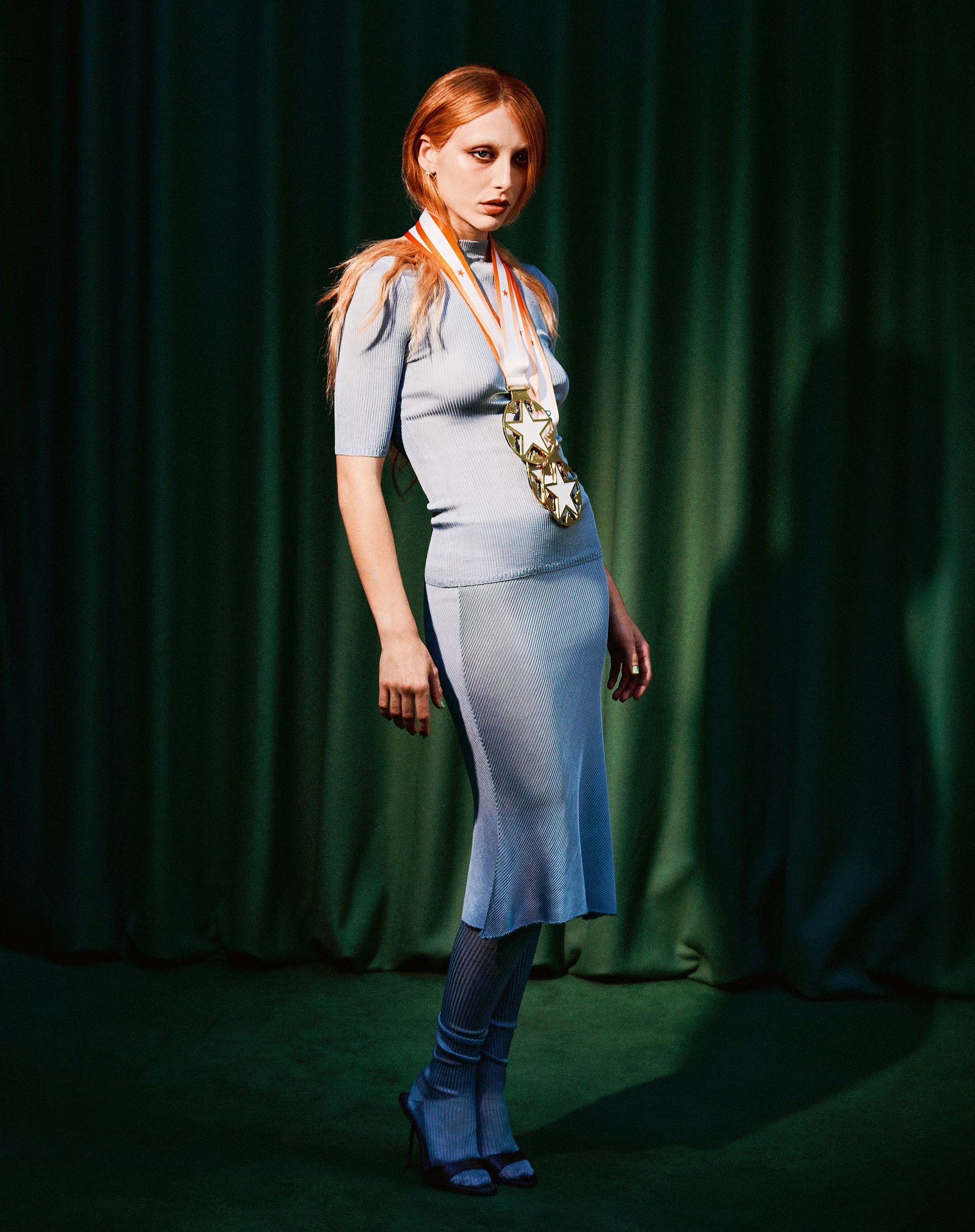
Vogue Daily
Vítejte v klubu Emmy Chamberlain, cover star únorové Vogue CS
Milena Žuravljova20. 1. 2026
Události
Odhalení lednové titulky Vogue s Hanou Janatou, hvězdou kampaně Valentino
Jan Boublík13. 12. 2025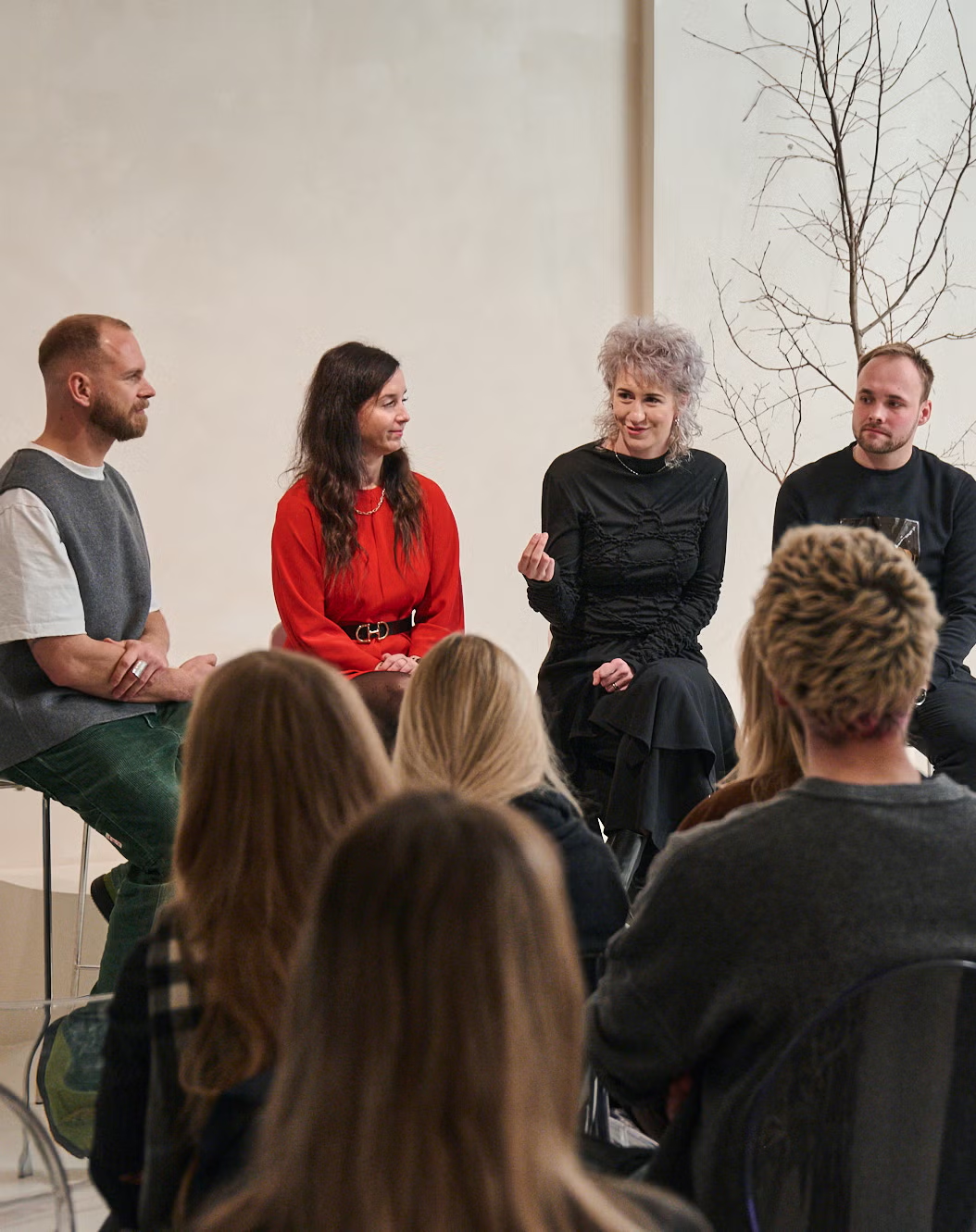
Společnost
